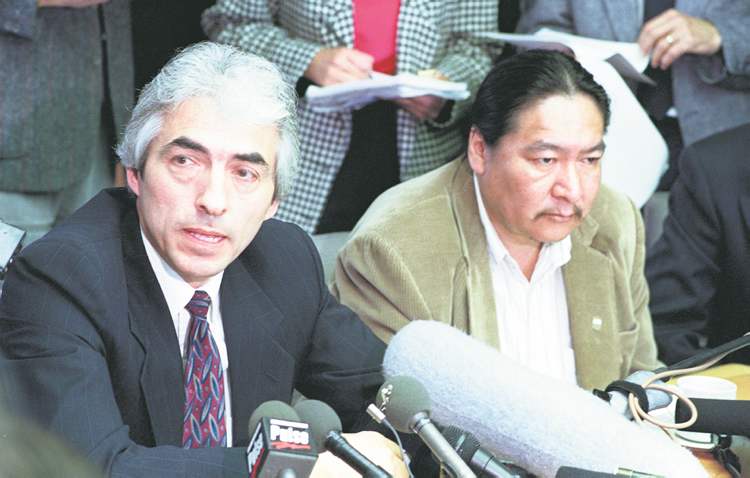He was the embodiment of aboriginal experiences
Advertisement
Read this article for free:
or
Already have an account? Log in here »
To continue reading, please subscribe:
Monthly Digital Subscription
$1 per week for 24 weeks*
- Enjoy unlimited reading on winnipegfreepress.com
- Read the E-Edition, our digital replica newspaper
- Access News Break, our award-winning app
- Play interactive puzzles
*Billed as $4.00 plus GST every four weeks. After 24 weeks, price increases to the regular rate of $19.00 plus GST every four weeks. Offer available to new and qualified returning subscribers only. Cancel any time.
Monthly Digital Subscription
$4.75/week*
- Enjoy unlimited reading on winnipegfreepress.com
- Read the E-Edition, our digital replica newspaper
- Access News Break, our award-winning app
- Play interactive puzzles
*Billed as $19 plus GST every four weeks. Cancel any time.
To continue reading, please subscribe:
Add Free Press access to your Brandon Sun subscription for only an additional
$1 for the first 4 weeks*
*Your next subscription payment will increase by $1.00 and you will be charged $16.99 plus GST for four weeks. After four weeks, your payment will increase to $23.99 plus GST every four weeks.
Read unlimited articles for free today:
or
Already have an account? Log in here »
Hey there, time traveller!
This article was published 18/05/2013 (4531 days ago), so information in it may no longer be current.
The image resonates more than two decades later, even as the details of what or why are lost.
Elijah Harper sitting in the Manitoba legislature on June 12, 1990, holding an eagle feather in protest. Some can recall the specific objection, but for most it’s a vague recollection of a constitutional battle and Quebec relating to something called the Meech Lake accord.
And for most Canadians, that is where their Elijah Harper story ends.
I haven’t been in touch with Elijah, or others involved with Meech Lake for many years. But I was stung by the news of his death; stung because I had planned to connect with him soon to gather his perspective, 20 years after writing his biography, on current aboriginal protests and what messages he would share with today’s aboriginal students and leaders.

Elijah was the embodiment of modern-day Canadian aboriginal experiences, from his Red Sucker Lake upbringing and love of nature, the illnesses he battled, his removal from home, first by health officials and later for residential school, his own struggles with alcohol, and his involvement in aboriginal politics that started with a run for Grade 9 student council in Garden Hill.
He won that seat, getting all but two votes: one cast by his opponent and the other his own. Why did he vote against himself? The answer was so Elijah: “I don’t know. I just felt I shouldn’t vote for myself.” He was laughing when he told me that.
Elijah then joined the wave of organized aboriginal student movements in universities in the 1970s. It was there he met Ovide Mercredi and Phil Fontaine, two other key players in the Meech Lake story.
Elijah left university after two years, but not aboriginal politics. In 1978, he was elected chief of Red Sucker Lake — he was 29 years old. And then, in 1981, he became the first treaty Indian elected to the Manitoba legislature.
He began his opening speech in his native tongue, the first time Cree entered the official records of the legislature. He, as always, thanked those who had elected him and then spoke to the pressing issues facing aboriginal people: poor housing and health, extremely high unemployment rates, ongoing fallouts from the residential school experiences, and more.
The legislature was mesmerized, according to others in the room. It wasn’t new information, but having a treaty Indian speaking to it for the first time in the house added a weight like never before.
What stays with me from my interviews and travels with Elijah are his intelligence, his quiet sense of humour, his resilience, thoughtfulness, his care to always thank those who helped him, and his sensitive, humble nature, all of which were expressed in his quiet way of talking.
Elijah wrote the introduction to the biography. He described how problems needed to be tackled through two lenses, personal circumstances and the system. “We must build houses for the homeless, but we must also build better communities around them. We must cure the sick, but we must also eliminate the poor water, inadequate sanitation, poor nutrition and poverty that make our people sick. If we don’t solve our problems on these two levels, we will be eternally fighting against a current over which we have no control.”
What also strikes me is how he ended the introduction with words of strength and courage, which is what the eagle feather symbolizes.
“During those days when I stood in the legislature to speak for aboriginal people, our voice was one. I could feel the strength of all our people, a generation of people, giving strength to my voice. In unity there is strength, in unity there is power, in unity there is hope. It is a feeling I never want to lose. It is a feeling I know our people felt every day hundreds of years ago, and it is a feeling I want all aboriginal people to share again.”
Pauline Comeau, author of Elijah, No Ordinary Hero, was a Winnipeg Free Press legislative reporter during the Meech Lake accord saga. Today she is a freelance writer living in Ottawa.



